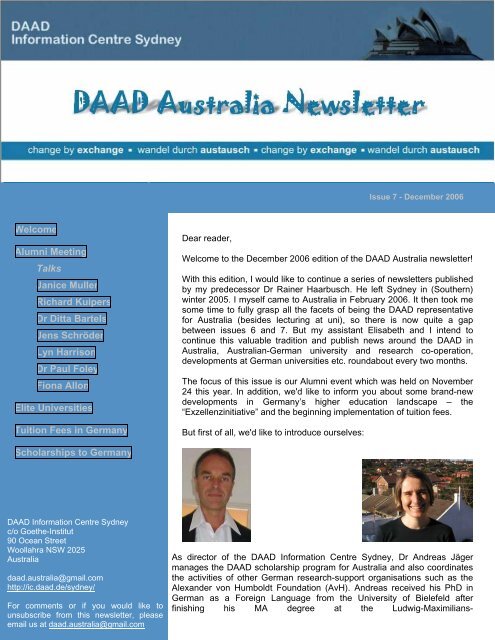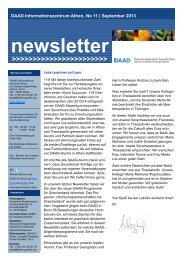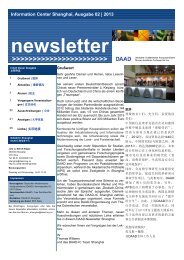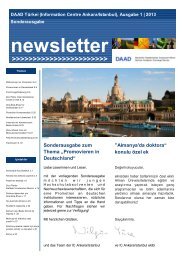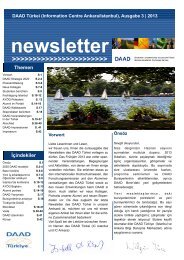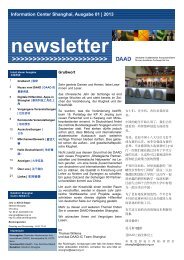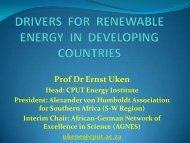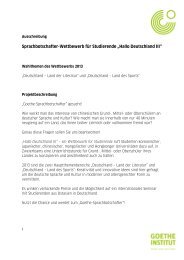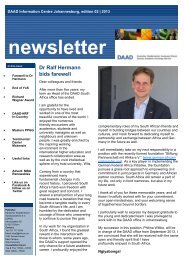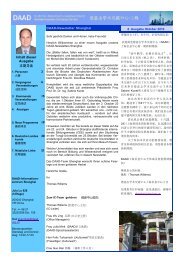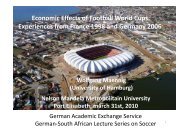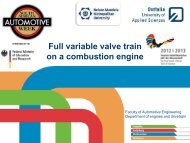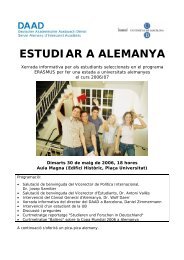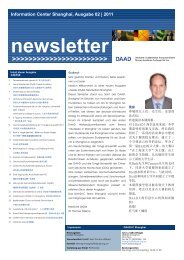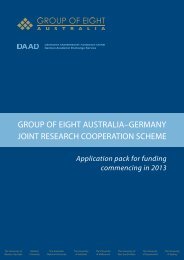Issue 7, December 2006 - DAAD
Issue 7, December 2006 - DAAD
Issue 7, December 2006 - DAAD
You also want an ePaper? Increase the reach of your titles
YUMPU automatically turns print PDFs into web optimized ePapers that Google loves.
<strong>Issue</strong> 7 - <strong>December</strong> <strong>2006</strong><br />
Welcome<br />
Alumni Meeting<br />
Talks<br />
Janice Muller<br />
Richard Kuipers<br />
Dr Ditta Bartels<br />
Jens Schröder<br />
Lyn Harrison<br />
Dr Paul Foley<br />
Fiona Allon<br />
Elite Universities<br />
Tuition Fees in Germany<br />
Dear reader,<br />
Welcome to the <strong>December</strong> <strong>2006</strong> edition of the <strong>DAAD</strong> Australia newsletter!<br />
With this edition, I would like to continue a series of newsletters published<br />
by my predecessor Dr Rainer Haarbusch. He left Sydney in (Southern)<br />
winter 2005. I myself came to Australia in February <strong>2006</strong>. It then took me<br />
some time to fully grasp all the facets of being the <strong>DAAD</strong> representative<br />
for Australia (besides lecturing at uni), so there is now quite a gap<br />
between issues 6 and 7. But my assistant Elisabeth and I intend to<br />
continue this valuable tradition and publish news around the <strong>DAAD</strong> in<br />
Australia, Australian-German university and research co-operation,<br />
developments at German universities etc. roundabout every two months.<br />
The focus of this issue is our Alumni event which was held on November<br />
24 this year. In addition, we'd like to inform you about some brand-new<br />
developments in Germany’s higher education landscape – the<br />
“Exzellenzinitiative” and the beginning implementation of tuition fees.<br />
But first of all, we'd like to introduce ourselves:<br />
Scholarships to Germany<br />
<strong>DAAD</strong> Information Centre Sydney<br />
c/o Goethe-Institut<br />
90 Ocean Street<br />
Woollahra NSW 2025<br />
Australia<br />
daad.australia@gmail.com<br />
http://ic.daad.de/sydney/<br />
For comments or if you would like to<br />
unsubscribe from this newsletter, please<br />
email us at daad.australia@gmail.com<br />
As director of the <strong>DAAD</strong> Information Centre Sydney, Dr Andreas Jäger<br />
manages the <strong>DAAD</strong> scholarship program for Australia and also coordinates<br />
the activities of other German research-support organisations such as the<br />
Alexander von Humboldt Foundation (AvH). Andreas received his PhD in<br />
German as a Foreign Language from the University of Bielefeld after<br />
finishing his MA degree at the Ludwig-Maximilians-
<strong>Issue</strong> 7 - <strong>December</strong> <strong>2006</strong><br />
Welcome<br />
Alumni Meeting<br />
Talks<br />
Janice Muller<br />
Richard Kuipers<br />
Dr Ditta Bartels<br />
Jens Schröder<br />
Lyn Harrison<br />
Dr Paul Foley<br />
Fiona Allon<br />
Elite Universities<br />
Tuition Fees in Germany<br />
Scholarships to Germany<br />
University of Munich. Before coming to Australia, Andreas was working as<br />
the Deputy Director of a private language school in Germany. Since<br />
February <strong>2006</strong>, he has been in charge of the <strong>DAAD</strong> Information Centre in<br />
Sydney and also works as a lecturer in the Department of Germanic<br />
Studies at the University of Sydney.<br />
Elisabeth Meister has a Master of Arts in history and linguistics from the<br />
Ludwig-Maximilians-University in Munich. She worked freelance in the<br />
publishing industry before moving to Australia in September 2003. In<br />
addition to her position as part-time assistant for the <strong>DAAD</strong>, Elisabeth<br />
also works for the Goethe-Institut and as a freelance translator.<br />
Alumni-Event<br />
The first-ever Alumni Meeting of Goethe-Institut, <strong>DAAD</strong> and Humboldt<br />
alumni was a roaring success. After coffee and cake, followed by a panel<br />
discussion about Australian Cultural policies with Karilyn Brown from the<br />
Australia Council, Klaus Krischok from the Goethe-Institut and Andreas<br />
Jäger, about 100 guests were treated to a choice of 8 short spotlight talks<br />
on Germany, ranging from personal experiences in cross-cultural<br />
research to comparisons between German and Australian universities<br />
and government support for the video game industry. After a short<br />
feedback session, food and drinks (thanks to the Goethe-Institut, the<br />
German Consulate General and last but not least to the <strong>DAAD</strong> in Bonn!)<br />
were served and guests mingled in the foyer and on the balcony of the<br />
Goethe-Institut in leafy Woollahra. While famous German DJ Hans<br />
Nieswandt put on funky dance tunes, people chatted, danced, mingled<br />
and drank up all the alcohol the Goethe-Institut had to offer until the party<br />
finally ended long after midnight. With the evening having been such a<br />
success, we'll certainly endeavour to repeat this event next year. Your<br />
feedback and suggestions are absolutely welcome in order to help us<br />
make the event even bigger and better next time!<br />
<strong>DAAD</strong> Information Centre Sydney<br />
c/o Goethe-Institut<br />
90 Ocean Street<br />
Woollahra NSW 2025<br />
Australia<br />
daad.australia@gmail.com<br />
http://ic.daad.de/sydney/<br />
For comments or if you would like to<br />
unsubscribe from this newsletter, please<br />
email us at daad.australia@gmail.com<br />
Das erste Alumni-Treffen von Goethe-Institut, <strong>DAAD</strong> und Alexander von<br />
Humboldt-Stiftung war ein voller Erfolg. Nach ersten Möglichkeiten zum<br />
Kennenlernen bei Kaffee und Kuchen diskutierten Karilyn Brown vom
<strong>Issue</strong> 7 - <strong>December</strong> <strong>2006</strong><br />
Welcome<br />
Alumni Meeting<br />
Talks<br />
Janice Muller<br />
Richard Kuipers<br />
Dr Ditta Bartels<br />
Jens Schröder<br />
Lyn Harrison<br />
Dr Paul Foley<br />
Fiona Allon<br />
Elite Universities<br />
Tuition Fees in Germany<br />
Australia Council, Klaus Krischok vom Goethe-Institut und Andreas Jäger<br />
über australische Kultur- und Bildungspolitik. Danach hatten die ca. 100<br />
Gäste die Qual der Wahl aus zwei Kurzvortragsreihen; die<br />
Bandbreitereichte dabei von persönlichen Erfahrungen in der Forschung<br />
zwischen den Kulturen über einen Vergleich zwischen deutschen und<br />
australischen Universitäten bis hin zu Gedanken zur staatlichen<br />
Unterstützung für die Videospielentwicklung. Nach einer kurzen<br />
Feedback-Diskussion wurden Essen und Getränke serviert (Dank an das<br />
Goethe-Institut, das Deutsche Generalkonsulat und nicht zuletzt an den<br />
<strong>DAAD</strong> in Bonn!) und die Gäste hatten Gelegenheit, sich im Foyer oder<br />
auf dem großen Balkon des Goethe-Instituts inmitten des grünen<br />
Stadtteils Woollahra zu unterhalten und kennen zu lernen. Der berühmte<br />
deutsche DJ Hans Nieswandt legte auf, und so wurde getanzt, gegessen,<br />
geredet und der gesamte Alkoholvorrat des Goethe-Instituts geleert, bis<br />
der Abend lange nach Mitternacht ausklang. Nicht zuletzt aufgrund des<br />
großen Erfolgs dieses Treffens planen wir in nicht allzu ferner Zukunft<br />
weitere solche Ereignisse. Ihre Kommentare, Wünsche und Feedback<br />
sind dazu herzlich willkommen, damit das nächste Treffen noch besser<br />
werden kann!<br />
Scholarships to Germany<br />
For all those who were unable to attend, we’re happy to provide short<br />
summaries of all talks:<br />
Für alle, die am Alumni-Abend nicht teilnehmen konnten, hier die<br />
Kurzfassungen der sehr interessanten Beiträge:<br />
<strong>DAAD</strong> Information Centre Sydney<br />
c/o Goethe-Institut<br />
90 Ocean Street<br />
Woollahra NSW 2025<br />
Australia<br />
daad.australia@gmail.com<br />
http://ic.daad.de/sydney/<br />
For comments or if you would like to<br />
unsubscribe from this newsletter, please<br />
email us at daad.australia@gmail.com<br />
Janice Muller<br />
Documentary Theatre in Germany<br />
Theatre Director Janice Muller recently returned from Germany courtesy<br />
of the Sydney Goethe Institute's Dramaturgy Exchange Scholarship.<br />
While there, she was a guest of the Dramaturgy Department at the Maxim<br />
Gorki Theater in Berlin and also observed the final weeks of rehearsal for<br />
a new "documentary theatre" production by acclaimed German theatre<br />
group Rimini Protokoll. This company, comprised of three talented and<br />
prolific directors, premiered their latest work "Karl Marx: Das Kapital Band<br />
ins" in Düsseldorf on 4 November <strong>2006</strong>. Rimini Protokoll's work explores
<strong>Issue</strong> 7 - <strong>December</strong> <strong>2006</strong><br />
Welcome<br />
Alumni Meeting<br />
Talks<br />
Janice Muller<br />
Richard Kuipers<br />
Dr Ditta Bartels<br />
Jens Schröder<br />
Lyn Harrison<br />
Dr Paul Foley<br />
Fiona Allon<br />
Elite Universities<br />
Tuition Fees in Germany<br />
Scholarships to Germany<br />
theatricality in real life and brings reality on to the stage. They frequently<br />
work with "real life experts" in place of actors - in this production with a<br />
range of people whose lives intersected in some way with Karl Marx's<br />
famous work - resulting in a surprisingly warm and amusing night at the<br />
theatre. For more information: http://www.rimini-protokoll.de/<br />
Richard Kuipers:<br />
Current German Cinema - No Flash in the Pan<br />
In the context of his visit to the Munich Film Festival in July, Variety critic<br />
and Festival of German Cinema advisor Richard Kuipers discussed the<br />
current status of German Cinema. He noted that Germany’s film industry<br />
has been on an artistic and commercial upswing initiated by the success<br />
of “Run Lola Run” in 1998, and cited the success of German Film<br />
Festivals staged by Goethe-Institutes around the world as evidence of<br />
sustained interest in New German Cinema. Richard named the influence<br />
of second-generation German filmmakers, the significant efforts of<br />
institutions such as German Films and the Goethe-Institut, and a series of<br />
bold and highly impressive films dealing with the re-unification of<br />
Germany and potent social topics as major contributors to this success.<br />
Richard concluded his address with an overview of the new German films<br />
premiered at Munich. He declared that once again, the Festival of<br />
German Cinema will face its on-going and most happy problem again in<br />
2007, with too many good films to choose from.<br />
<strong>DAAD</strong> Information Centre Sydney<br />
c/o Goethe-Institut<br />
90 Ocean Street<br />
Woollahra NSW 2025<br />
Australia<br />
daad.australia@gmail.com<br />
http://ic.daad.de/sydney/<br />
For comments or if you would like to<br />
unsubscribe from this newsletter, please<br />
email us at daad.australia@gmail.com<br />
Dr Ditta Bartels<br />
Quality in German Universities – Opportunities for Australia<br />
On my two recent trips to Germany this year, I have been impressed with<br />
a new dynamism in the German university landscape. The most<br />
impressive effort is that of the Federal Government, called<br />
Exzellenzinitiative. Some of its more important points for Australia would<br />
be:<br />
- Commitment to the Humboldt ethos to link research and teaching<br />
- A real emphasis on Masters Programs, with a strong focus on<br />
research in them<br />
- Internationalisation is seen in terms of enhancing the quality of<br />
research and for attracting very high quality students - and not at all in<br />
terms of extra income for the universities<br />
- there is no privatisation of universities at all<br />
- Let us accept more German PhD students into our research<br />
projects and we bring in a whole lot of links to these new directions in<br />
German research<br />
- Let us send our PhD students to the new (and the old) Graduate<br />
Schools and they will even obtain scholarships!
<strong>Issue</strong> 7 - <strong>December</strong> <strong>2006</strong><br />
Welcome<br />
Alumni Meeting<br />
Talks<br />
Janice Muller<br />
Richard Kuipers<br />
Dr Ditta Bartels<br />
Jens Schröder<br />
Lyn Harrison<br />
Dr Paul Foley<br />
Fiona Allon<br />
Elite Universities<br />
Tuition Fees in Germany<br />
Scholarships to Germany<br />
- In the Graduate Schools and the International Masters Programs,<br />
there is a great deal of scope for international academics to come and<br />
teach and research, and funding is available<br />
- Let us consider whether the German model for Masters<br />
education should not be looked at more closely in Australia and followed<br />
more<br />
- More applications for research visits in Germany, through AvH<br />
and <strong>DAAD</strong><br />
- More invitations to German researchers to visit in Australia<br />
- More joint projects, preferably not only on research, but also in<br />
teaching<br />
- The new initiative of FEAST (Forum for European-Australian<br />
Science and Technology Cooperation, www.feast.org)<br />
Jens Schröder<br />
The cultural perception of computer and video games in Germany and<br />
Australia and their impact on support mechanisms<br />
I was discussing whether Australian state support mechanisms could be<br />
applied to the German video game development scene which, especially<br />
compared to the market size, is relatively small. In Australia, various<br />
mechanisms exist for the industry on a state and federal level: grants for<br />
game (prototype) development, covering travel and trade fair expenses,<br />
attracting investors and sponsoring conferences. However, for sociohistoric<br />
and economic reasons, mechanisms that work in Australia might<br />
not meet success in Germany, where the public discourse perpetuates an<br />
intense moral panic. In Australia, international success is the main<br />
criterion for funding, while specific Australian content plays no role<br />
whatsoever. In addition, certain traits of Australian society, such as the<br />
strong egalitarian tradition, make for a more positive disposition towards<br />
games. I therefore argued that if games are to overcome public<br />
scepticism and broaden an understanding for the medium, they need<br />
content which relates to specific German interests and characteristics;<br />
however, this approach might limit the international appeal of these<br />
games.<br />
<strong>DAAD</strong> Information Centre Sydney<br />
c/o Goethe-Institut<br />
90 Ocean Street<br />
Woollahra NSW 2025<br />
Australia<br />
daad.australia@gmail.com<br />
http://ic.daad.de/sydney/<br />
For comments or if you would like to<br />
unsubscribe from this newsletter, please<br />
email us at daad.australia@gmail.com<br />
Lyn Harrison<br />
Deutschland - Mein Wintermärchen<br />
I spoke about my experience as the recipient of a Goethe-Institut<br />
scholarship awarded to a student who had studied German at the<br />
Goethe-Institut in Sydney. The scholarship enabled me to attend an 8-<br />
week intensive course at the Goethe-Institut in Freiburg where I spent a<br />
fantastic and stimulating time. Overall there were 127 students from 47<br />
countries, resembling a mini UN. The teaching was excellent and<br />
completely engaging across a range of methods. There was a broad and
<strong>Issue</strong> 7 - <strong>December</strong> <strong>2006</strong><br />
Welcome<br />
Alumni Meeting<br />
Talks<br />
Janice Muller<br />
Richard Kuipers<br />
Dr Ditta Bartels<br />
Jens Schröder<br />
Lyn Harrison<br />
Dr Paul Foley<br />
Fiona Allon<br />
Elite Universities<br />
Tuition Fees in Germany<br />
Scholarships to Germany<br />
interesting cultural program which included excursions to Speyer,<br />
Strasbourg and Zürich. My German language and social life benefitted<br />
through being paired with a local Freiburger under the ‘Tandem Partner’<br />
scheme. I concluded my talk with some statistics about German students<br />
in Australia including that Germany now ranks ninth in terms of numbers<br />
studying here across all sectors.<br />
Dr Paul Foley<br />
How an academic experience in Germany can change a career direction<br />
(neuroscientist to medical historian)<br />
I travelled to Germany in late 1995 as an ‘accompanying spouse’. My wife<br />
had been awarded an AvH Fellowship to pursue medical research at the<br />
University of Würzburg. Despite the legendary abruptness of (some)<br />
Würzburger, we felt at home very quickly: Würzburg offers everything we<br />
could wish for in terms of culture, entertainment, retail facilities and, of<br />
course, Franconian wine and beer. I initially enrolled at the University as a<br />
Magister Artium candidate in history as the most economical means of<br />
improving my German, but had graduated within six semesters and<br />
commenced my Doktorarbeit at the Institute for the History of Medicine,<br />
from where I graduated summa cum laude in 2001. This allowed me to<br />
return in 2002, this time as an AvH Fellow myself. Equally important was<br />
that I came to know a university system which is much better than its<br />
reputation in Germany; unfortunately I fear that much of the intellectual<br />
variety and challenge which I experienced will be lost in the rushed attempt<br />
to emulate American universities. In short, both my wife and I regard our<br />
time in Germany as amongst the happiest years of our lives; our original<br />
one year stay was ultimately extended to five. We both maintain the<br />
contacts and friendships established during our two Fellowships,<br />
continuing to visit Germany every year.<br />
<strong>DAAD</strong> Information Centre Sydney<br />
c/o Goethe-Institut<br />
90 Ocean Street<br />
Woollahra NSW 2025<br />
Australia<br />
daad.australia@gmail.com<br />
http://ic.daad.de/sydney/<br />
For comments or if you would like to<br />
unsubscribe from this newsletter, please<br />
email us at daad.australia@gmail.com<br />
Fiona Allon<br />
Berlin: Open City?<br />
Since German unification more than a decade ago, Berlin has been<br />
celebrated as both a cosmopolitan city and a social and cultural project for<br />
demonstrating the diversity and openness of the ‘new Germany’ - where<br />
”open” means “ready” for change, receptive, and forward-looking. Debates<br />
about Berlin’s identity, its dire financial predicament, and its future as a<br />
culturally dynamic, open and “creative city” are ongoing. Of course, this<br />
fascination with the “creative” and “cultural” is certainly not unique to Berlin<br />
- the discourse has been taken up with great fervour all around the world<br />
as countries start to think seriously about the post-industrial futures of their<br />
cities.<br />
I’m interested in Berlin’s openness not just in terms of the glossy ‘world<br />
city’ rhetoric, but in what it means for groups of people to actually live
<strong>Issue</strong> 7 - <strong>December</strong> <strong>2006</strong><br />
Welcome<br />
Alumni Meeting<br />
Talks<br />
Janice Muller<br />
Richard Kuipers<br />
Dr Ditta Bartels<br />
Jens Schröder<br />
Lyn Harrison<br />
Dr Paul Foley<br />
Fiona Allon<br />
Elite Universities<br />
Tuition Fees in Germany<br />
Scholarships to Germany<br />
there. Berlin is a place where the local, national and transnational meet<br />
and intersect: Ossies and Wessies, the East-German Vietnamese guestworkers,<br />
Turkish-Germans, Russian-Germans, Africans, Cubans, and so<br />
on. For me, this is where Berlin as an open city becomes the most<br />
fascinating. It’s not just the physical form and structure of the city, the<br />
creative uses of spaces and sites, the multiple dynamic cultural scenes, it’s<br />
also the intangible and not so visible spaces the city provides for testing<br />
out new forms of identity, belonging, and ultimately citizenship.<br />
Dr Andrew McIntosh<br />
Biomechanical links between Sydney and Heidelberg<br />
I was very fortunate to be a <strong>DAAD</strong> scholarship holder at Heidelberg<br />
University in the early 1990s. I undertook part of my doctoral research<br />
there in the field of biomechanics and have since continued to collaborate<br />
with my former supervisor and a biomechanics group at the Orthopaedic<br />
Clinic in Heidelberg. The latter has developed into a wider collaboration<br />
between my research group and theirs. Learning German has been a<br />
great asset, not just for breaking the ice with German scientists and<br />
friends, but in understanding and experiencing the German culture. The<br />
opportunity presented by the <strong>DAAD</strong> has been very significant in my career<br />
and provided on-going opportunities for collaboration and exchange with<br />
Germany.<br />
<strong>DAAD</strong> Information Centre Sydney<br />
c/o Goethe-Institut<br />
90 Ocean Street<br />
Woollahra NSW 2025<br />
Australia<br />
daad.australia@gmail.com<br />
http://ic.daad.de/sydney/<br />
For comments or if you would like to<br />
unsubscribe from this newsletter, please<br />
email us at daad.australia@gmail.com<br />
Elite-Universitäten<br />
Auch wenn das Niveau deutscher Hochschulen gut bis spitze ist, fehlte es<br />
bisher doch an herausragenden Namen, die auch im Ausland weithin<br />
bekannt waren. Ein Grund hierfür ist die Abwesenheit deutscher Unis auf<br />
den ersten Plätzen internationaler Rankings, was ein eigenes Thema ist.<br />
Und Elite-Unis gab es durch die egalitäre Tradition in der alten<br />
Bundesrepublik ebenfalls nicht. Als Elite-Universität firmierte in neuerer<br />
Zeit höchstens die International University Bremen, die 2001 als<br />
Deutschlands erste private Elite-Uni nach amerikanischem Vorbild eröffnet<br />
wurde.<br />
Die 2005 von der früheren Bundesforschungsministerin Edelgard Bulmahn<br />
ins Leben gerufene "Exzellenzinitiative" mit einem Gesamtbudget in Höhe<br />
von 1,9 Milliarden Euro soll dies ändern<br />
(http://www.wissenschaftsrat.de/exini_start.html,<br />
http://www.dfg.de/en/research_funding/coordinated_programmes/excellen<br />
ce_initiative/).<br />
Die Bewertungskriterien setzen sich aus drei Elementen zusammen:<br />
Graduiertenschulen zur Förderung des wissenschaftlichen Nachwuchses<br />
durch optimale Promotionsbedingungen; Exzellenzcluster zur Förderung<br />
der Spitzenforschung, die einen besonderen Schwerpunkt setzen und<br />
eng mit außeruniversitären Forschungseinrichtungen sowie der Wirtschaft
<strong>Issue</strong> 7 - <strong>December</strong> <strong>2006</strong><br />
Welcome<br />
Alumni Meeting<br />
Talks<br />
Janice Muller<br />
Richard Kuipers<br />
Dr Ditta Bartels<br />
Jens Schröder<br />
Lyn Harrison<br />
Dr Paul Foley<br />
Fiona Allon<br />
Elite Universities<br />
Tuition Fees in Germany<br />
Scholarships to Germany<br />
<strong>DAAD</strong> Information Centre Sydney<br />
c/o Goethe-Institut<br />
90 Ocean Street<br />
Woollahra NSW 2025<br />
Australia<br />
daad.australia@gmail.com<br />
http://ic.daad.de/sydney/<br />
For comments or if you would like to<br />
unsubscribe from this newsletter, please<br />
email us at daad.australia@gmail.com<br />
kooperieren sollen; sowie Zukunftskonzepte zum projektbezogenen<br />
Ausbau der universitären Spitzenforschung, um an die Weltspitze<br />
vorzudringen. Einer Universität muss mindestens eine Schule sowie ein<br />
Cluster bewilligt werden, um auch im Bereich Zukunftskonzepte erfolgreich<br />
sein zu können.<br />
Am 13. Oktober <strong>2006</strong> gaben die DFG und der Wissenschaftsrat die<br />
Entscheidung bekannt: Mit zwei Elite-Universitäten, der Ludwig-<br />
Maximilians-Universität München (LMU) und der Technischen Universität<br />
München (TUM), sowie zahlreichen Graduiertenschulen und<br />
Spitzenforschungszentren liegt Bayern dabei an der Spitze, gefolgt von<br />
Baden-Württemberg, das mit der TH Karlsruhe ebenfalls eine Elite-<br />
Universität vorzuweisen hat. Nordrhein-Westfalen lag im Mittelfeld vor<br />
Niedersachsen und Hessen, während der ganze Osten außer Sachsen<br />
leer ausging.<br />
Den drei Siegern winkt ein zweistelliger Millionenbetrag pro Jahr - nicht<br />
viel im Vergleich zu internationalen Spitzenuniversitäten wie etwa Harvard.<br />
Auch die bisher von Finanzierungsproblemen geplagte International<br />
University Bremen erhielt jetzt von der Jacobs Foundation eine<br />
Großspende in Höhe von 200 Millionen Euro - doppelt so viel wie die drei<br />
frisch gekürten Elite-Universitäten zusammen (http://www.iubremen.de/news/media/pressreleases/10678/index.php.de).<br />
Dafür müssen<br />
die neuen Elite-Unis nicht ihren Namen ändern, während die Bremer<br />
Universität jetzt "Jacobs University Bremen" heißt. Dennoch sehen die drei<br />
Sieger-Unis jetzt ihre Chance, durch die Förderung zukunftsträchtiger<br />
Forschung den Sprung an die Weltspitze zu schaffen.<br />
Neben einiger Unzufriedenheit mit dem Verfahren selbst, vornehmlich aus<br />
der Politik, gibt es aber auch generelle Kritik am Prinzip der Förderung<br />
einzelner Elite-Universitäten: Demnach habe Deutschland im Vergleich der<br />
ökonomisch fortgeschrittenen Länder eine der niedrigsten<br />
Hochschulabsolventenquoten, sodass es kontraproduktiv sei, Gelder aus<br />
der "Breite" abzuziehen, um eine Elite zu fördern. Allgemein wird die<br />
Exzellenzinitiative aber positiv gesehen: als Signal dafür, dass Leistung<br />
sich lohnt und auch belohnt wird, als Förderung des Wettbewerbs<br />
zwischen den deutschen Universitäten und als Mittel zur Stärkung der im<br />
internationalen Wettbewerb um die besten Köpfe wichtigen<br />
Hochschulmarken.<br />
Die Bewerbungen für die 2. Runde der Exzellenzinitiative haben bereits<br />
begonnen, eine Entscheidung wird im Oktober 2007 erwartet. Man darf<br />
gespannt sein!<br />
Elite-Universities<br />
Even though education at German universities is of a high standard<br />
generally, there are no famous names or elite universities that are wellknown<br />
outside of Germany: No German institution occupies a space<br />
among the world's top-ranked universities, and the only self-proclaimed
<strong>Issue</strong> 7 - <strong>December</strong> <strong>2006</strong><br />
Welcome<br />
Alumni Meeting<br />
Talks<br />
Janice Muller<br />
Richard Kuipers<br />
Dr Ditta Bartels<br />
Jens Schröder<br />
Lyn Harrison<br />
Dr Paul Foley<br />
Fiona Allon<br />
Elite Universities<br />
Tuition Fees in Germany<br />
Scholarships to Germany<br />
elite university so far was the International University Bremen, a private<br />
university founded in 2001.<br />
In order to change this state of affairs, in June 2005 the German federal<br />
and state governments agreed on a so-called "Excellence Initiative" with a<br />
total budget of €1.9 billion to promote top-level research in Germany,<br />
improve its competitiveness on an international level and raise the global<br />
profile of Germany's top performers in academia and research.<br />
(http://www.dfg.de/en/research_funding/coordinated_programmes/excellen<br />
ce_initiative/). Decisions were made in three categories: Graduate schools<br />
for promoting young researchers, developing internationally competitive<br />
centres of top-level research, and increasing the recognition and prestige<br />
of German research; Clusters of Excellence to establish world-class<br />
research and competitive training facilities in order to enhance scientific<br />
networking and cooperation; and most importantly, Institutional Strategies<br />
to increase the competitiveness of top-level university research at an<br />
international level. This third line of funding can only be granted to<br />
universities who have successfully established at least one cluster of<br />
excellence and one graduate school.<br />
On October 13 this year, the first round of the Excellence Initiative was<br />
concluded and the Karlsruhe University of Technology, the Ludwig-<br />
Maximilians-University of Munich (LMU) and the Munich University of<br />
Technology (TUM) were awarded funding in all three lines, thereby<br />
winning the coveted (if inofficial) title of "Elite University". All three<br />
institutions now see their chance to make the leap into the ranks of the<br />
world's top universities.<br />
However, the new elite universities combined will only receive about half<br />
as much money as the International University Bremen recently did from a<br />
private donation - the Jacobs Foundation provided much-needed funds<br />
amounting to €200 million (http://www.iubremen.de/news/media/pressreleases/10678/index.php)<br />
- but then, the<br />
university is now called "Jacobs University Bremen", whereas the winners<br />
of the Excellence Initiative will of course keep their names.<br />
Applications for the second round have already started, with decisions<br />
slated to be made in October 2007, so interesting times are ahead!<br />
<strong>DAAD</strong> Information Centre Sydney<br />
c/o Goethe-Institut<br />
90 Ocean Street<br />
Woollahra NSW 2025<br />
Australia<br />
daad.australia@gmail.com<br />
http://ic.daad.de/sydney/<br />
For comments or if you would like to<br />
unsubscribe from this newsletter, please<br />
email us at daad.australia@gmail.com<br />
Studiengebühren<br />
Anders als in Australien waren in Deutschland Studiengebühren bisher<br />
nicht üblich, werden aber seit Jahren schrittweise eingeführt: Zunächst gab<br />
es Gebühren für Langzeitstudierende, GasthörerInnen (Studierende<br />
anderer Hochschulen) und TeilnehmerInnen von Aufbau- und Master-<br />
Studiengängen. An privaten Hochschulen dagegen fielen auch bisher<br />
schon Gebühren von bis zu mehreren tausend Euro pro Semester an. Ab<br />
dem Wintersemester <strong>2006</strong>/2007 erheben einige Bundesländer nun auch<br />
an staatlichen Universitäten Studiengebühren für das Erststudium, sodass
<strong>Issue</strong> 7 - <strong>December</strong> <strong>2006</strong><br />
Welcome<br />
Alumni Meeting<br />
Talks<br />
Janice Muller<br />
Richard Kuipers<br />
Dr Ditta Bartels<br />
Jens Schröder<br />
Lyn Harrison<br />
Dr Paul Foley<br />
Fiona Allon<br />
Elite Universities<br />
Tuition Fees in Germany<br />
Scholarships to Germany<br />
<strong>DAAD</strong> Information Centre Sydney<br />
c/o Goethe-Institut<br />
90 Ocean Street<br />
Woollahra NSW 2025<br />
Australia<br />
daad.australia@gmail.com<br />
http://ic.daad.de/sydney/<br />
For comments or if you would like to<br />
unsubscribe from this newsletter, please<br />
email us at daad.australia@gmail.com<br />
je nach Bundesland und Hochschule mit Gebühren von rund 500 Euro pro<br />
Semester zu rechnen sind (gesetzliches Limit). Promotionsstudiengänge<br />
sind derzeit weiterhin überall gebührenfrei.<br />
Die Gebühren sollen den Wettbewerb unter den Hochschulen weiter<br />
verstärken und so ihre Position auf dem weltweiten Bildungsmarkt<br />
verbessern. Zudem wird argumentiert, dass mehr Geld für Bildung nötig<br />
ist, um deutsche Unis an die Weltspitze zu bringen.<br />
GegnerInnen von Studiengebühren befürchten allerdings, dass die Gelder<br />
kaum den Hochschulen zu Gute kommen werden, da nach der Einführung<br />
von Gebühren staatliche Zuschüsse zurückgefahren werden könnten und<br />
es in Deutschland rein rechtlich nicht möglich ist, die Gebühren verbindlich<br />
den Hochschulen zuzuweisen. Zudem könnten Gebühren dazu führen,<br />
dass sich AbiturientInnen aus finanziell schwächeren Haushalten noch<br />
weniger als bisher schon zutrauen, ein Studium finanzieren zu können.<br />
In Australien hingegen, wo für deutsche Verhältnisse astronomische<br />
Studiengebühren normal geworden sind, klingen solche Zahlen eher<br />
niedlich. Studieren in Deutschland sollte daher auch weiterhin nicht an der<br />
Geldfrage scheitern - zumal der <strong>DAAD</strong> zunächst etwaige Studiengebühren<br />
für StipendiatInnen übernimmt.<br />
Australians studying and researching at German Universities<br />
Durch zahlreiche Messeauftritte, Informationsveranstaltungen an Unis und<br />
direkte Informations-Emails an German Departments und International<br />
Offices konnten wir mehr Aufmerksamkeit auf Programme deutscher Unis,<br />
Austauschmöglichkeiten und das Stipendienangebot des <strong>DAAD</strong> lenken.<br />
So gab es reges Interesse an den Stipendien für die<br />
Deutschlandkundlichen Winterkurse. Insgesamt haben sich 67<br />
Studierende aus Australien fuer den Winterkurs 2007 beworben. 25 von<br />
ihnen konnte ein Stipendium verliehen werden. Wir hatten damit mehr<br />
BewerberInnen als in den 3 Jahren vorher, also seit das Programm<br />
existiert. Das sind schöne Zahlen! Diese Studierenden werden demnächst<br />
nach Essen, Freiburg und Leipzig (7-wöchiger Winterkurs) und dieses Jahr<br />
erstmals auch zusätzlich nach Berlin (4-wöchiger Winterkurs der FU Berlin<br />
- FUBIS) aufbrechen.<br />
Auch für das Germanistenstipendium (One-Semester Scholarship for<br />
University Students Reading German Studies) konnten wir mehr Interesse<br />
als in den Vorjahren wecken. Insgesamt haben 10 von 24 BewerberInnen<br />
<strong>2006</strong> ein Stipendium für das Sommersemester 2007 bzw. für das<br />
Wintersemester 2007/08 bekommen. Ein Erfolg ist die relativ hohe Anzahl<br />
von BewerberInnen und die hohe Zahl von Förderungen, was u.a. auch für<br />
die gute Qualität der Bewerbungen spricht.
<strong>Issue</strong> 7 - <strong>December</strong> <strong>2006</strong><br />
Welcome<br />
Alumni Meeting<br />
Talks<br />
Janice Muller<br />
Richard Kuipers<br />
Dr Ditta Bartels<br />
Jens Schröder<br />
Lyn Harrison<br />
Dr Paul Foley<br />
Fiona Allon<br />
Elite Universities<br />
Tuition Fees in Germany<br />
Für die anderen Stipendienprogramme, vor allem das<br />
Forschungsstipendium für DoktorandInnen, junge AkademikerInnen und<br />
WissenschaftlerInnen (Research Grants for Doctoral Candidates, Young<br />
Academics and Scientists) sowie für das Studienstipendium für Graduierte<br />
(Study Scholarships for Graduates of All Disciplines) und das<br />
Künstlerstipendium (Study Scholarships for Artists) liegen noch keine<br />
Zahlen vor. Die Auswahlen werden bis Mitte Februar in Bonn getroffen<br />
werden.<br />
Ich hoffe, dass wir mit Ihrer Hilfe unsere Politik auch im nächsten Jahr<br />
fortsetzen können, indem wir möglichst viele DozentInnen und<br />
ProfessorInnen als MultiplikatorInnen gewinnen. Sprechen Sie Ihre viel<br />
versprechenden Studierenden an! Vermitteln Sie ihnen einen Eindruck von<br />
den Vorteilen eines Studien- oder Forschungsaufenthalts in Deutschland.<br />
Machen Sie den <strong>DAAD</strong> und sein Stipendienprogramm bekannt. Wir<br />
springen dann gerne ein, informieren und beraten!<br />
Wir wünschen allen ein wunderschönes Weihnachtsfest<br />
und einen guten Rutsch in ein viele Wünsche erfüllendes Jahr 2007 !<br />
Scholarships to Germany<br />
For request of information, comments or if you would like to unsubscribe<br />
from this newsletter, please email us at daad.australia@gmail.com<br />
Former issues can be downloaded at:<br />
http://ic.daad.de/sydney/newsletter.htm<br />
Yours<br />
<strong>DAAD</strong> Information Centre Sydney<br />
c/o Goethe-Institut<br />
90 Ocean Street<br />
Woollahra NSW 2025<br />
Australia<br />
daad.australia@gmail.com<br />
http://ic.daad.de/sydney/<br />
For comments or if you would like to<br />
unsubscribe from this newsletter, please<br />
email us at daad.australia@gmail.com


